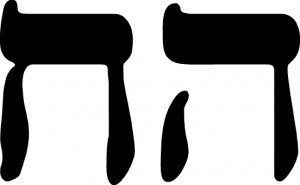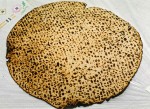Matza and chametz are both composed of the same letters, except that matza is spelled with a hey and chametz with a chet. The only difference between a hey and a chet is that the chet is completely closed from three sides, while the hey has an opening on top. (photo by Yoninah via commons.wikimedia.org)
On Pesach, we are only allowed to eat matza, not chametz. What is the difference between chametz (leavened bread) and matza? How do they differ?
Matza differs from chametz in two respects:
1) With chametz, the dough rises, while for matza, the dough remains as is. In spiritual terms this means that chametz signifies arrogance, while matza signifies modesty and humility.
Matza is essentially lechem oni, the bread of poverty, of affliction (Deuteronomy 16:3 and Rashi’s commentary on this verse). Matza signifies humility, which manifests itself especially in lechem oni. The mitzva (obligation) to eat matza can only be observed with humility. The matza that the Israelites ate in Egypt was lechem oni.
2) The words matza and chametz are both composed of the same letters, except that matza is spelled with a hey and chametz with a chet.
The hey is similar to the chet. Both consist of three lines and are open from below. The only difference between them is that the chet is completely closed on the top, while the hey has an opening on the upper left side.

The open side below (which chet and hey share) symbolizes that “sin crouches at the entrance.” (Genesis 4:7) The closure on both sides in the letter chet indicates that there is no escape from that fact, i.e., that sin crouches at the entrance. The opening on top, in the hey, indicates that notwithstanding this fact there is an opening above, indicating the possibility to leave one’s condition behind and to become a better person.
It is indeed no more than a small opening, but our sages teach us that G-d says: “‘Open for Me as little as the eye of the needle, and I will open for you like the entrance to a hall.’ For a single thought of self-improvement can change one instantaneously from an altogether wicked person into an altogether righteous person.” (Talmud Kidushin 49b)
These two differences between matza and chametz are interdependent. Where there is conceit and grandiose self-esteem, one doesn’t think of improvement. If there is humility, then, even if one may have stumbled, they will think of improvement. Where there is humility, there is no attempt at self-justification. Rather, one takes honest stock of oneself and, when finding improprieties within oneself, he or she will try to improve. With haughtiness, however, one will always find rationalizations to justify and excuse all doings.
Here’s a story to illustrate this point. When seeing a pauper, the one who seeks to avoid the mitzva of tzedaka will use the argument of Turnus Rufus (Baba Batra 10a), who asked of Rabbi Akiva: “If your G-d loves the poor, why does He not support them?” In other words, for reasons of haughtiness, if one accepts one’s wealth as one’s due and, in fact, feels that they deserve even more than what they already have, why then should they give away any of it? Arrogance doesn’t allow for the reality of another and, therefore, one may take it for granted that the other is not his or her equal. To this person, therefore, it is obvious that the other is poor simply because they don’t deserve any better. As it is surely the Divine Will that the other be poor, why then should one give him anything?
The humble one, possessed of humility, reasons differently.
a) He examines and judges himself whether he is essentially better than the other, and his self-examination leads him to give charity. It is written in Psalms 99:4, “You have done justice and tzedaka in Jacob.” That is, the justice, i.e. the self-judgment, leads him to tzedaka.
b) The humble one contemplates this possibility, but also notes that he himself has been blessed generously in spite of his own deficient status and condition. Thus, he is moved to conclude that we are as children of G-d. As these conditions relate to the mitzva of tzedaka, so, too, they apply to all good deeds.
This year, when we come to celebrate Passover at the festival seders, especially when we eat the matza, and when we are surrounded by our children, grandchildren and guests, we celebrate our people’s freedom from Egypt. Take time to contemplate the spiritual nature of matza, to be humble and feel the needs of our less fortunate friends, family and community members. We are celebrating, as well, the freedom of being able to go from haughtiness to kindness, from our limitations to our freedom. When we celebrate Passover this way, we will naturally feel happy that we are able to help provide what others need.
May this Passover prove to be an inclusive festival, where everyone will be able to rejoice and feel for one another. Wishing you a kosher and happy Passover.
Esther Tauby is a local educator, writer and counselor.

